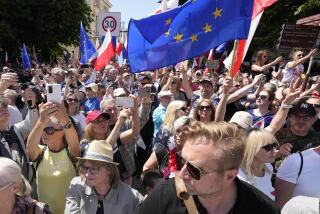Language Issue Sparks Rally in Soviet Moldavia
MOSCOW â Hundreds of thousands of people, defying a Kremlin warning against nationalist extremism, staged a daylong rally Sunday in the central square of the Moldavian capital, Kishinev, to demand that Moldavian be made the republicâs official language.
The rally came a day after the Communist Party Central Committee, in an unusual and tough statement, warned that nationalist extremists in the Baltic republics are endangering the future of the entire region by pressing their demands for independence from the Soviet Union.
Evening News Report
Soviet televisionâs evening news program, âVremya,â reporting Sunday on the Moldavian rally, noted without comment that those who joined in the demonstration included extremists from the Baltics who supported calls that Moldavia secede from the Soviet Union.
The Moldavian legislature is set to consider on Tuesday a bill that would make Moldavian the official language of the republic, which lies in the southwest corner of the Soviet Union. Up to 300,000 people gathered in Kishinevâs Victory Square on Sunday to call for adoption of the law. Organizers said the rally ended peacefully in the early evening with Moldavian national dances.
Like the Baltic republics of Lithuania, Estonia and Latvia, Moldavia was incorporated into the Soviet Union in accordance with a 1939 Soviet-German nonaggression pact. Neighboring Romania had been forced to surrender the region to the Soviet Union in 1940.
After its annexation, Soviet dictator Josef Stalin ordered Moldavian, a dialect of the language spoken in Romania, to be written in Cyrillic rather than in the traditional Latin alphabet.
Moldavians make up about 64% of the republicâs 4.2 million people but are outnumbered in many major cities, where Russian is widely used.
Many of the republicâs activists who want to make Moldavian the official language of the republic also have called on the local Parliament to order a return to the Latin alphabet by 1995.
Ethnic Russians, who make up about 30% of the republicâs population, have been striking for the last week to express their opposition to the proposed legislation, which they view as discriminatory. In addition, about 50,000 Russians rallied in the republic on Friday to express their opposition to the proposed law.
100 Factories Idled
The strikes in Moldavia, which have idled nearly 100 factories and stopped work at some railway stations, mirrored a tactic used by ethnic Russians in the Baltic republic of Estonia.
There, non-Estonians opposed a voting law that required a minimum of two yearsâ residency in a single district.
The Estonian Parliament, under pressure from Moscow, has agreed to reconsider the law.
A leader of a Baltic nationalist movement, meanwhile, said Sunday that he fears Saturdayâs Central Committee statement may have been made to prepare public opinion in case of the use of force against Baltic activists.
The statement, which took about 20 minutes to read at the beginning of the evening news, warned that if nationalists in the Baltics achieve their goals, âthe consequences could be catastrophic for their people. Their very ability to survive could come under question.â
Hands Across the Baltics
The Central Committee declaration came three days after nearly 2 million people joined hands across the Baltic republics in a demonstration to protest the signing of the secret pact between Nazi Germany and the Soviet Union that cleared the way for the Soviet annexation of the then-independent states.
More to Read
Sign up for Essential California
The most important California stories and recommendations in your inbox every morning.
You may occasionally receive promotional content from the Los Angeles Times.










